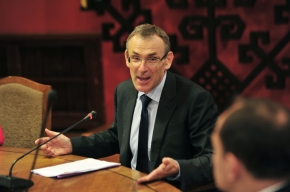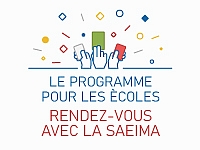 Galerie
Galerie
On Friday, 19 October, during the discussion on topical issues of the EU agenda, members of the European Affairs Committee of the Saeima and Andris Piebalgs, EU Commissioner for Development, agreed that the EU’s next Multiannual Financial Framework should be oriented towards growth by ensuring smart investments in education and research, and involvement of national parliaments in the decision-making process of the EU should be enhanced.
“The European Union currently is on a path of closer integration; therefore, involvement of national parliaments in the EU’s decision-making process should be enhanced, including involvement in distribution of the EU’s Multiannual Financial Framework for 2014–2020; for Latvia its priorities include equalisation of direct payments to farmers and maintaining of cohesion funding at the current level,” indicates Zanda Kalniņa-Lukaševica, Chairperson of the European Affairs Committee.
Member states could reach an agreement on the EU’s next Multiannual Financial Framework for 2014–2020 in November. Participants of the discussion agreed that from Latvia’s perspective, the main problem at present is the proposal of the largest net contributors to reduce the total amount of the EU’s budget. In view of that fact, Commissioner Piebalgs predicted that the final stage of negotiations could be very difficult.
In addressing the current issues of EU’s economic development, participants of the discussion welcomed the awarding of the Nobel Peace Prize to the European Union; it signifies that the European Union is not merely an economic but also a political union. Because the financial and economic crisis has had diverse effects on European countries, their path of growth will also differ; nevertheless, by drafting a smart multiannual financial framework and allocating inter alia sustainable investments in education, the EU should stimulate its own growth. Piebalgs expressed the view that the EU member states should reach an agreement on changes in tax policy; he mentioned the possible agreement on a financial transaction tax proposed by nine member states as an example of how the EU can acquire its own financial resources.
During the discussion, development cooperation, which is under the purview of Andris Piebalgs, was addressed. “In Latvia there is a great interest in development cooperation policy because it is an important tool of the European Union’s common foreign policy which provides support to less developed countries. So far, in discussions on the Latvia’s priorities during its presidency of the Council of the European Union, development cooperation has been identified as one of the core priorities,” indicated Kalniņa-Lukaševica. Piebalgs indicated that his sphere of responsibility matches this priority of Latvia during its presidency of the Council of the European Union and that it will be an excellent opportunity for our state to show what it is capable of.
Saeima Press Service







